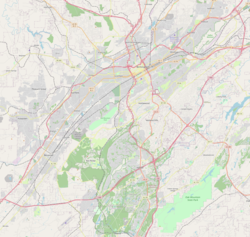First Baptist Church, Kingston | |
 | |
| Location | 4600 Ninth Ave. N Birmingham, Alabama |
|---|---|
| Coordinates | 33°32′24″N86°46′6″W / 33.54000°N 86.76833°W |
| Area | less than one acre |
| Built | 1961 |
| Architectural style | Colonial Revival |
| MPS | Civil Rights Movement in Birmingham, Alabama MPS |
| NRHP reference No. | 05000300 [1] |
| Added to NRHP | April 20, 2005 |
First Baptist Church, Kingston is a historic church at 4600 Ninth Avenue North in Birmingham, Alabama. It was built in 1961 and added to the National Register of Historic Places in 2005. [1] [2] The congregation was organized in 1930, it was led by George W. Dickerson from 1941 to 1972, it played a leading role in the Civil Rights Movement and served as a site for mass meetings held by the Alabama Christian Movement for Human Rights. The church is now surrounded by a public housing project erected in the late 1950s. [3]
In 2000, the congregation relocated to a new building at 4240 Ninth Avenue North and sold this structure the next year to Lighthouse Church Ministries. [3]




